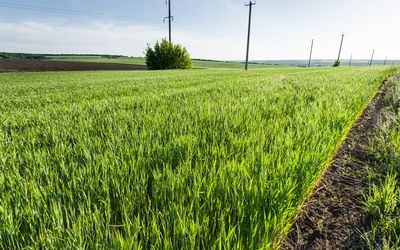The land must be seeded with the youth
by Wandile Sihlobo,
2016-01-08 06:02:38.0
SEEING the joy on the faces of the successful matriculants of 2015 reminds me of my matric year in 2007. At the time, results were released before the end of December. I spent my summer holidays at home, in the Eastern Cape, and as in many African homes, my mother liked waking us up early in the morning, even if there was not much to do.
She would say "indoda ayilali kuphume ilanga", loosely translated as "a man does not slumber until the sun rises". On the day of the release of the 2007 matric results, she did not wake me up as harshly as she normally did. Instead I emerged from dreamland to the welcome news that I had matriculated with "merit".
I left home in early January, filled with excitement at the prospect of going to university to read for a Bachelor of Science in Agricultural Economics. I had been told the university would be full, with many students seeking places to study, but to my surprise, the school of agriscience and agribusiness was not as full as other faculties. Not many students were keen to go into agriculture.
Perhaps that was because there was more demand for chartered accountants, engineers, information technologists and other such graduates at the time.
But the needs of society change, and there is no question that today food security is high on the global agenda, particularly in Africa.
This has predominantly been driven by a growing global population that is expected to increase by 16% in the next 15 years to 8.5-billion people by 2030. This will propel demand for agricultural products, which in some countries could lead to food insecurity.
For this reason, agricultural and agribusiness studies should be promoted among the youth of today.
One would expect countries with large and young populations such as SA, where 58% of its people are under 30, to be much more proactive in this regard.
The agricultural sector is still dominated by the older generation, which means there’s plenty of room to increase youth participation.
Specifically in the primary agricultural sector, a large number of South African farmers are ageing and are not being replaced, which could affect future food security.
According to AgriSA, the average South African farmer is 62 years old. In the 1980s, SA had about 128,000 commercial farmers, but this number has decreased considerably to about 30,000 in 2014.
Some of these farmers have conventional knowledge that can be transferred to young people, and it is important for SA to preserve such knowledge as it has an influence on the productivity of our primary agriculture. I should highlight that I am not suggesting that anyone can be a farmer, but even those who work with farmers on the services side can benefit from knowledge transfers that could be vital to the future prosperity of the agricultural sector.
This issue of youth involvement in agriculture is also central to many discussions among decision makers in the government and at private institutions. These discussions usually highlight opportunities in the sector, such as farming, careers as agricultural professionals, or working as service providers.
Along with this, many challenges faced by the agricultural sector have also been highlighted, from policy uncertainty to profitability issues. To solve these challenges, the sector would benefit from an influx of young, bright minds with new ways of thinking.
I remain hopeful that young people will continue to see agriculture as the cornerstone of development, and that decision makers will continue to involve them in conversations about the future of the sector in the hope that in a few years, we might start reaping the benefits and remain a food-secure nation.
Youth involvement in the agricultural sector is crucial if we are to retain our current positive food-security status.
• Sihlobo is an economist at Grain SA. He writes in his personal capacity. Follow him on Twitter @WandileSihlobo

Picture: THINKSTOCK
SEEING the joy on the faces of the successful matriculants of 2015 reminds me of my matric year in 2007. At the time, results were released before the end of December. I spent my summer holidays at home, in the Eastern Cape, and as in many African homes, my mother liked waking us up early in the morning, even if there was not much to do.
She would say "indoda ayilali kuphume ilanga", loosely translated as "a man does not slumber until the sun rises". On the day of the release of the 2007 matric results, she did not wake me up as harshly as she normally did. Instead I emerged from dreamland to the welcome news that I had matriculated with "merit".
I left home in early January, filled with excitement at the prospect of going to university to read for a Bachelor of Science in Agricultural Economics. I had been told the university would be full, with many students seeking places to study, but to my surprise, the school of agriscience and agribusiness was not as full as other faculties. Not many students were keen to go into agriculture.
Perhaps that was because there was more demand for chartered accountants, engineers, information technologists and other such graduates at the time.
But the needs of society change, and there is no question that today food security is high on the global agenda, particularly in Africa.
This has predominantly been driven by a growing global population that is expected to increase by 16% in the next 15 years to 8.5-billion people by 2030. This will propel demand for agricultural products, which in some countries could lead to food insecurity.
For this reason, agricultural and agribusiness studies should be promoted among the youth of today.
One would expect countries with large and young populations such as SA, where 58% of its people are under 30, to be much more proactive in this regard.
The agricultural sector is still dominated by the older generation, which means there’s plenty of room to increase youth participation.
Specifically in the primary agricultural sector, a large number of South African farmers are ageing and are not being replaced, which could affect future food security.
According to AgriSA, the average South African farmer is 62 years old. In the 1980s, SA had about 128,000 commercial farmers, but this number has decreased considerably to about 30,000 in 2014.
Some of these farmers have conventional knowledge that can be transferred to young people, and it is important for SA to preserve such knowledge as it has an influence on the productivity of our primary agriculture. I should highlight that I am not suggesting that anyone can be a farmer, but even those who work with farmers on the services side can benefit from knowledge transfers that could be vital to the future prosperity of the agricultural sector.
This issue of youth involvement in agriculture is also central to many discussions among decision makers in the government and at private institutions. These discussions usually highlight opportunities in the sector, such as farming, careers as agricultural professionals, or working as service providers.
Along with this, many challenges faced by the agricultural sector have also been highlighted, from policy uncertainty to profitability issues. To solve these challenges, the sector would benefit from an influx of young, bright minds with new ways of thinking.
I remain hopeful that young people will continue to see agriculture as the cornerstone of development, and that decision makers will continue to involve them in conversations about the future of the sector in the hope that in a few years, we might start reaping the benefits and remain a food-secure nation.
Youth involvement in the agricultural sector is crucial if we are to retain our current positive food-security status.
• Sihlobo is an economist at Grain SA. He writes in his personal capacity. Follow him on Twitter @WandileSihlobo




























Change: 0.11%
Change: 0.16%
Change: -0.42%
Change: 0.35%
Change: -0.54%
Data supplied by Profile Data
Change: 0.00%
Change: 0.00%
Change: 0.11%
Change: 0.00%
Change: 0.00%
Data supplied by Profile Data
Change: -0.06%
Change: 0.00%
Change: -0.03%
Change: 0.07%
Change: -0.11%
Data supplied by Profile Data
Change: 0.00%
Change: 0.00%
Change: 0.00%
Change: 0.00%
Change: 0.00%
Data supplied by Profile Data